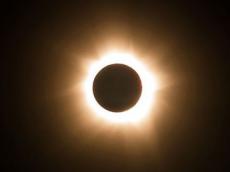|
|
TODAY.AZ / Society
Solar eclipse seen in Baku sky
04 November 2013 [15:05] - TODAY.AZ
 By AzerNews
By AzerNewsBaku residents witnessed a solar eclipse at 17:24 [local time] on November 3.
The solar eclipse was visible in Baku 5-10 minutes before sunset. The lower part of the solar disk began to darken at that time. Baku residents were able to observe this phenomenon for 8-9 minutes.
According to Shamakhi Astrophysical Observatory named after N. Tusi of the National Academy of Sciences (ANAS), a solar eclipse began at 14:06 [local time] on November 3 and ended at 19:28 [local time]. Generally it was observed throughout the equator line, partly in Africa and America.
According to the Observatory officials, solar eclipse has no impact on human health.
Solar eclipse occurs when the Moon passes between the Sun and Earth, and fully or partially blocks the Sun. This can happen only at new moon, when the Sun and the Moon are in conjunction. In a total eclipse, the disk of the Sun is fully obscured by the Moon. In partial and annular eclipses only part of the Sun is obscured.
An eclipse is a natural phenomenon. Nevertheless, in some ancient and modern cultures, solar eclipses have been attributed to supernatural causes or regarded as bad omens. A total solar eclipse can be frightening to people who are unaware of its astronomical explanation, as the Sun seems to disappear during the day and the sky darkens in a matter of minutes.
As looking directly at the Sun can lead to permanent eye damage or blindness, special eye protection or indirect viewing techniques are used when viewing a solar eclipse.
URL: http://www.today.az/news/society/127870.html
 Print version
Print version
Views: 1551
Connect with us. Get latest news and updates.
See Also
- 06 February 2026 [12:11]
Azerbaijan reviews 2025 progress on ‘Green Energy Space’ strategy - 06 February 2026 [11:29]
Azerbaijan honors victims of 2023 Türkiye earthquake - 06 February 2026 [10:59]
Azerbaijan reviews startup ecosystem and future development prospects - 05 February 2026 [14:40]
Baku court sentences Sahakyan and Gukasyan to 20 years over war crimes - 05 February 2026 [13:32]
Baku Military Court hands down life sentences to Armenian citizens in war crimes trial - 05 February 2026 [13:12]
Baku Military Court sentences Arayik Harutyunyan to life imprisonment - 05 February 2026 [13:06]
"Non-Aligned Movement Youth Week" kicks off in Baku with focus on diplomacy, sustainable development - 05 February 2026 [13:03]
Baku Military Court sentences Armenian citizen Levon Mnatsakanyan to life imprisonment - 05 February 2026 [12:49]
Azerbaijan to showcase innovative urban planning in liberated territories at World Urban Forum - 05 February 2026 [12:15]
US vice president Vance to visit Azerbaijan and Armenia after Italy trip, back peace deal
Most Popular
 Epstein files blur fact and fiction with shocking Biden ‘replacement’ claim
Epstein files blur fact and fiction with shocking Biden ‘replacement’ claim
 India has failed Iran and Armenia - competition with the Middle Corridor will not take place
India has failed Iran and Armenia - competition with the Middle Corridor will not take place
 Trump alleges Iran nuclear revival while sources say military action on table
Trump alleges Iran nuclear revival while sources say military action on table
 Zelenskyy says Putin fears only Trump, warns Russia could threaten Europe
Zelenskyy says Putin fears only Trump, warns Russia could threaten Europe
 Azerbaijan and Armenia in Abu Dhabi - how one leader changed world
Azerbaijan and Armenia in Abu Dhabi - how one leader changed world
 Baku Military Court sentences Armenian citizen Levon Mnatsakanyan to life imprisonment
Baku Military Court sentences Armenian citizen Levon Mnatsakanyan to life imprisonment
 Armenian citizen Madat Babayan sentenced to 19 years over Khojaly genocide
Armenian citizen Madat Babayan sentenced to 19 years over Khojaly genocide
